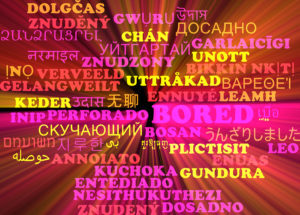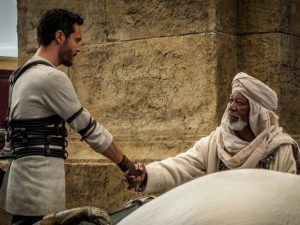Lin Wilder's Blog, page 50
September 23, 2016
Hacked By A Bored but Creative Pole

Sometime last night, a very bored Polish individual decided to write and then publish a post in Polish on my Lin Wilder site. In case you are curious, the headline was: Troska o fasadę oraz czystość which translates to: “Concern for the facade and the cleanliness.” The remainder of the content was advertising copy for a company called Graffiti Removal Lublin. I did find a Facebook page in case you are interested.
September 22, 2016
Troska o fasadę oraz czystość
W dzisiejszym świecie coraz to więcej osób korzysta z różnorodnych metod aby reklamować swoją firmę. Większość z nich w ostatnim czasie często korzysta z elewacji obiektu jako przestrzeni reklamowej, ponieważ gruntownie na taką reklamę taka przestrzeń się nadaje. Istotne, by elewacja była zadbana oraz czysta – tutaj pomoże usługa Usuwanie graffiti Lublin. Rozległa przestrzeń nadaje się do możliwego wykorzystania, a firmy w głównej mierze korzystają z bocznych ścian budynków czy też z siatki przyczepionej do rusztowań. W szczególe firmy decydują się właśnie na taką reklamę na elewacji budynków, albowiem reklama ta jest na takim budynku niesłychanie widzialna oraz na pewno swoim potężnym formatem przyciągnie uwagę klientów. By taką reklamę wydrukować należy zgłosić się do specjalnej drukarni, jaka specjalizuje się właśnie w drukach wielkoformatowych. W takich drukarniach wolno też wydrukować gotowe bandery, ponieważ takimi również się takie drukarnie absorbują. Przede wszystkim należy zadbać o wygląd takiej reklamy, ponieważ żeby dobrze mogła się opisywać to na pewno musi być dobrze wykonana, by nie szpeciła krajobrazu. Zobacz naszą www Mycie elewacji Warszawa
September 19, 2016
Power, Women and Mary
September 12, 2016
Working With Editors: Six Tips For Inexperienced Novelists
 After working with five editors in the course of publishing my last five books, I have learned the essential elements of establishing a good relationship between my editor and me. Like most lessons, many have been learned through mistakes, some very costly. Since I doubt that my experience is unique, I ‘ll detail the lessons learned and then briefly explain each one.
After working with five editors in the course of publishing my last five books, I have learned the essential elements of establishing a good relationship between my editor and me. Like most lessons, many have been learned through mistakes, some very costly. Since I doubt that my experience is unique, I ‘ll detail the lessons learned and then briefly explain each one.
September 4, 2016
The Labor of Obedience

Obedience: For many years, the word was a lightning rod to me. The concept connoted all that I disliked about being female: Powerless, submissive, conformance, passivity and the like. But then I became a Christian Catholic and a few years later, an Oblate of St. Benedict. And that word, like so many others in the vocabulary of faith became something I embraced; at times admittedly with gritted teeth.
August 28, 2016
The Ambiguity of Talent

We use the word talent to connote skill or expertise. Often, we mean an individual with intrinsic aptitudes toward a thing, whether it be athletics or mathematics, someone with unusual ability. Frequently, organizational recruiters look for specific aptitudes in people considered potential employees. In our “flattened secularized culture” (I love this phrase used by Bishop Robert Barron in his Word on Fire series) however, we perceive these capacities as our own, as our property to do with as we wish. Rarely do we see these capabilities as gifts, on loan.
August 22, 2016
The World of Ben Hur- The Movie

I should not be surprised at how opposed am I to the opinions of the pundits. But once again, my polar reaction to the majority is about the new movie, The World of Ben-Hur.
Remember Charlton Heston in the 1959 movie Ben Hur? The chariot race, the remarkable epic of a story? A remake cannot possibly come close to the original, right? And twenty-first-century directors, writers and actors simply cannot get even close to that Academy Award winning block-buster of close to sixty years ago. At least these are the loudly published judgments of Variety and the LA Times, and a number of others, those who ‘know.’ I smile as I write that statement: ‘those who know’ because the business of being a critic in these days where disapproval seems to reign is as competitive as is my business of writing. So many voices begging to be heard among the clamor, the temptation to shout irresistible. Therefore, we see comments like “Jack Huston is no Charlton Heston’ ‘Soap Box Derby’ , ’12 reasons why it flopped’ or ‘Ben Hur debacle’ in attempts to get the attention of readers. I agree with one critic but not in the way he intended the critical comparison; Huston is indeed no Heston: his portrayal of Judah Ben Hur is far better than was Heston’s in just about every way.
Within the first few minutes of this watching this new film, we hear that voice, iconic, instantly recognizable. Morgan Freeman. We sit up a little straighter and think, ‘maybe this will be more than another flick.’ Don’t get me wrong, I love movies of all kinds and hardly consider myself a critic for I am easily entertained by anything that gets me out of my head. However, this summer’s views of Stars Wars and Independence Day: Resurgence were disappointing, more than a little understatement here. They seemed more like video games than movies. So when my husband John suggested a movie this past Friday, I was happy to enjoy the air conditioning in the theater during these very hot August days. My expectations of Ben Hur , however, were low, very low. Not because of the reviews, I had not read them, did not even know the movie had been released.
Some background may be useful. The original book, Ben Hur: A Tale of the Christ was written in 1880 by Civil War General Lew Wallace and was considered to be the most influential Christian book of the nineteenth century. Perhaps, like me, you read it but quite a while ago. And maybe your memory of the Heston film was like mine in that Heston’s overacting so dominated the story line that it was difficult to remember the actual sequence of events.
The tale is universally human: insecurity, jealousy, rivalry, revenge, forgiveness and finally redemption. But the redemption comes at an agonizing cost. Arguably based on Wallace’s extensive and controversial battle experiences in the Civil War, antagonist Messala was adopted by Judah’s family and decides he must prove himself in the age old way of man, combat, by joining and rapidly rising in the Roman army. Judah Ben Hur is a wealthy Jew, a leader in the community of Judea. Upon the return of Messala now commander of the Roman garrison and a Tribune, to the home of his adopted family, national loyalty and faith collide. Inevitably, the brothers end up on opposite sides of the unbearable tensions in Roman occupied Jerusalem during the time of Christ’s public ministry. Misunderstandings and panic result in Ben Hur’s conviction of sedition and sentencing to years as a galley slave.
Huston’s portrayal of Judah is a portrait of splendid acting as is Morgan Freeman’s performance as the Arab who rescues Judah and convinces him to compete against Messala in the circus. An unpopular change in the original screenplay by Gore Vidal extensively broadens the role of Sheik Ilderim where Ilderim becomes both mentor and financial backer of Judah in the beloved circus where the citizens of Rome are entertained by men fighting to their death in the chariot races.
This ageless story is an epic and worthily told in the remake. This is a really great story, well-written, acted and with cinematography which leaves us breathless. Best of all, we are left with an indelible image of supernatural love in the face of actor Rodrigo Santoro, the man who plays Jesus.
August 15, 2016
The Ancient Wisdom of Stability

Stability: It’s an intriguing noun. Many lifetimes ago, I used it all the time to refer to critically ill patients, not as a noun but as as adverb upon naming all the physiologic parameters used to measure the cardiac and pulmonary status of critically ill patients under my care, “He’s been stable for the last hour…”
But now it means something I vow to do, to be, even when I want to run away. There are times I do battle to be faithful to the promise because I’m hurt or angry or just too exhausted to care. The combat can feel so all consuming that superhuman abilities are required only to discover an infusion of supernatural grace once the battle has ended.
Stability is one of the three promises an Oblate makes upon making her oblation. Along with fidelity and obedience. But even after over ten years as an Oblate, it’s stability that always grabs my heart and squeezes, sometimes painfully hard. The concept applies both to the ordinary aspects of any life but also to the extraordinary.
For Benedictines, Buddhists and mystics from all traditions, stability is pursued through rigorous attention to the present, a determined focus on a place inside where one can be, where one can stay. The Latin word is, after all, stasis which means stand. It’s the staying that is the work and the reason that St. Benedict placed so much emphasis on the persistence necessary to stand rather than run away. Benedict was Roman after all and had been immersed in the military culture of standing to fight and enduring the battle with steadfastness- to death.
In Chapter fifty-eight of the Rule of Benedict which we reread recently, Benedict admonishes the Abbott ‘not to grant newcomers to the monastic life an easy entry.’ The man or woman seeking the monastic life must show persistence far past the initial burst of enthusiasm. Even fifteen hundred years after the man called the Father of Monasticism wrote his rule, we are asked to pray, to seek to discern God’s will for a year before we make our profession at the altar as an Oblate of St. Benedict. How different the world would look were all major decisions made this way. About marriage or about pregnancy; my husband John remarks frequently that there would be far fewer abortions if a pregnancy lasted merely a few days or weeks rather than the better part of a year.
Prior to making his vows, the novice monk is admonished by St. Benedict that “…from this day he is no longer free to leave the monastery, nor to shake from his neck the yoke of the rule which in the course of so long a period of reflection, he was free either to reject or accept.”
Now the workshop where we are to toil faithfully at all these tasks is the enclosure of the monastery and stability if the community.
Of course, we Oblates are not monks. Our monastic enclosures are our marriages, children, illnesses, careers and the countless major and minor challenges of each individual life. Even after a long period like a year, however, we cannot see the struggles in front of us, the major obstacles looming like mountains as we work to endure an impossible situation. Still, after all these years, the implicit attraction and discipline of Benedict’s simply worded promises shape me and my life applying to every aspect of my day.
On this day, August 15, I ponder Mary, the Mother of God on the day we venerate as her assumption into heaven. And I think about her as she stood at the foot of the cross; was she given a vision of that celestial reunion?
 Hi Lin, I was delighted to hear from you last week! I tried ... by Berry Craig Vallejo
Hi Lin, I was delighted to hear from you last week! I tried ... by Berry Craig Vallejo
August 7, 2016
At the Boundary of Doubt: Faith

In listening to snippets of conversations at the gym, after daily Mass or casual conversations with other vacationers here in Pismo Beach, I hear the same anxieties, doubts and fears. Whether the subject is gang violence, terrorism or the upcoming presidential election, the sense of desperation mixed with cynicism is almost tangible. It can be contagious. Even for those few of us who refuse to watch the news, the headlines cannot be missed on the multiple television screens which adorn over half the walls of the gym where I work out while down on the central California coast. Strident, certain, and predictive of dire consequences if either he or she becomes President, the voiced opinions are increasingly passionate.
Because there are three churches celebrating daily Mass within a fifteen minute drive of our RV, we go each day to worship, listen and be renewed. This past Tuesday, Fr. Daniel at the Benedictine Monastery of the Risen Christ in San Luis Obispo talked about doubt and faith in a new and intriguing way. The monk was reflecting on the Gospel passage we know well: The apostles are alone in the boat and Christ returns from the mountain where he has prayed all night to find his disciples in the middle of the ocean. Jesus takes a shortcut to them by walking on top of the waves. It’s the middle of the night, the twelve are tired and his figure looks like a ghostly apparition walking on top of the waves. They are terrified. Hearing their fear, Jesus spoke to them:
Take courage, it is I, do not be afraid.
Of course, it is Peter who recovers first. Impetuous, impulsive, eager; so wonderfully human: “Lord if it is you, command me to come to you on the water.” We know what happens when he takes his eyes off Christ to notice the magnitude of the waves. He does what we do when we look or walk away from Jesus, he starts to drown.
But Fr. Daniel chose in his homily to look at that exact point- calling it the boundary where doubt and faith intersect. Peter was drowning, it is true. But rather than succumb to despair, he cried out,
Lord, save me! Immediately, Jesus stretched out his hand and caught him, and said to him, “O you of little faith, why did you doubt?”
These are the times, ‘teaching moments from God’, despite the depth of the blackness, where we can push through the gates of our doubts and stretch out our hands into the dark, reaching, trusting. And join with five million young people, Fr. Daniel exclaimed, five million, who showed up for World Youth Day to pray with Pope Francis in Krakow, Poland. To find that our faith has deepened, our hearts have stretched.
August 1, 2016
The Delicate Balance of Idleness and Work

Idleness is the enemy of the soul. When I first read that opening sentence of Chapter 48 of the Rule of Benedict, I recognized my paraphrased internal maxim created long ago: Boredom is a cancer of the soul. As a Benedictine oblate, I read through the Rule three times per year. One would think that those fifteen- hundred- year- old words would become tedious. But my experience is occasionally exactly the opposite of tedium. Like last week, while reading Chapter 48, the reading for July 28, ‘On the Daily Manual Labor’ when I noticed the emphasis placed on activities like reading, ‘rest on the bed in perfect silence.’ This time I took note of the next to last sentence: “Let all things be done with moderation…”
For much of my life, work has been where I found satisfaction to the point that workaholic could be a fitting adjective for anyone taking notice. The reason? Most likely there are many but primarily the knowledge that our time here is finite consequently my fear of wasting time, of not accomplishing all that I am capable of achieving. This is the reason that comments like John Cardinal Newman’s , “Nothing worth doing can be accomplished in a single lifetime,” were committed to memory long before I had any idea of becoming Catholic or of learning about men like Newman. The words conferred a sense of relief, almost a balm to the seemingly endless list of tasks looming before me.
A number of years ago, while I was still a Hospital Director in academic health care, my husband made a provocative statement about work: provocative to me anyway. His statement?
Work is anything you have to do: Anything at all that requires your attention.
We lived in a commuter house in northeast Connecticut where the lawn was larger than the house and I was regretting my poorly thought-out promise to mow it weekly and sometimes twice a week during the rainy season because I had a briefcase filled with documents which had to be signed, read or otherwise dispatched before the day began at 5am the next morning. The lawn seemed immense, a green football sized yard taunting me with the time it would take me to mow it-time I didn’t think I had.
His statement was uttered casually, without emphasis; heedless of its echo in my head as I threw all of my considerable anxiety into pushing the lawnmower up and down, up and down.
This is work?









